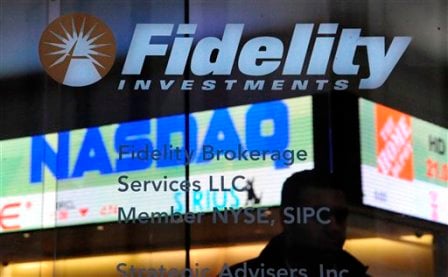Fidelity Investments said Thursday its operating profit rose 5 percent last year, boosted in part by job cuts, as revenue continued to lag after two years of unusual volatility in financial markets.
Fidelity Investments said Thursday its operating profit rose 5 percent last year, boosted in part by job cuts, as revenue continued to lag after two years of unusual volatility in financial markets.
The nation's largest mutual fund company also saw fund performance improve.
Fidelity is privately held and doesn't report quarterly financial numbers. But the Boston company said in its annual report that its operating income last year was $2.51 billion, excluding interest expenses and taxes.
That's up from $2.39 billion in 2008, when sharply declining markets eroded the value of assets that Fidelity and rival fund companies rely on for management fee income.
A market turnaround helped lift results last year, particularly for stocks and high-yield bonds, assets that generate more fee income for Fidelity than safe-harbor investments like money-market mutual funds.
In a letter to shareholders, Fidelity CEO and Chairman Edward "Ned" Johnson III said more than half of last year's profit increase came from the company's distribution operations rather than its asset management group. Fidelity's distribution operations offer investment products to clients, including funds managed by other companies.
Fidelity reported a nearly 11 percent decline in revenue last year, to $11.48 billion. The drop came as Fidelity cut its work force to about 37,000 from a peak of more than 46,000 in 2007, through layoffs, attrition and business reorganizations.
"Actions we took, some of them painful, were successful in reducing expenses during 2009, and we were thus able to report an increase in operating income," Johnson said.
While Fidelity's profit improved from 2008, it still lagged compared with 2007, when markets hit their historic peak. Last year's operating income was down 13 percent from 2007, and revenue was down 14 percent from two years ago.
Fidelity said its mutual funds performed better than 74 percent of their competitors last year, up from 56 percent in 2008. The improvement was biggest at Fidelity's stock funds, which beat two-thirds of their peers, up from just over one-third the year before.
But Fidelity reported a setback for its investment-grade bond funds. Those products, which avoid riskier areas of the bond market, beat 46 percent of their peers last year, down from 62 percent the previous year — a possible result, Johnson said, of "overly conservative investment policy which minimized risk."
Fidelity's fund performance has been spotty in recent years, and the company has faced growing competitive challenges from Vanguard Group and Capital Group's American Funds.
According to fund tracker Morningstar Inc., Fidelity saw $16.2 billion flow into its funds last year, and another $1.6 billion last month. But Fidelity still hasn't come close to making up the $37.3 billion that flowed out in 2008, Morningstar said.
Morningstar ranks Fidelity as the nation's third-largest fund manager, trailing Vanguard and American Funds. But the research firm's figures exclude money-market funds, where Fidelity is the market leader. Fidelity is the largest overall provider when its nearly $500 billion in money fund assets are added.
At the end of last year, Fidelity managed $1.5 trillion, up nearly 21 percent from year-end 2008.
Johnson, who is 79, has held the CEO and chairman titles at Fidelity since 1977. His family owns a 49 percent stake in the company, with key employees owning the rest.
Thursday's annual report offered no clues as to when Johnson might name a successor. Because of his age, speculation about who will replace him and when — including the possibility that his daughter, Abigail Johnson, will be the successor — has persisted for years. Fidelity says it has a succession plan, but won't disclose details.
Thursday's annual report also didn't indicate whether Rodger Lawson would be replaced as president, the company's No. 2 post. Last month, the 63-year-old announced plans to retire at the end of March, while remaining an adviser to Fidelity. The company's nine-member executive committee is collectively assuming Lawson's presidential duties for now. That group includes Abigail Johnson, who heads the Fidelity unit in charge of personal and workplace investing.







